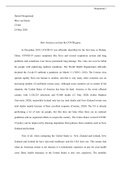Hoogenraad 1
Daniel Hoogenraad
Miss van Stenis
CV4tb
24 May 2020
How America can beat the COVID game
In December 2019, COVID-19 was officially identified for the first time in Wuhan,
China. COVID-19 causes symptoms like fever and several respiratory system and lung
problems and sometimes even leaves permanent lung damage. The virus can even be lethal
for people with underlying medical conditions. The World Health Organization officially
declared the Covid-19 outbreak a pandemic on March 11 (WHO, 2020). The Corona virus
spreads rapidly from one human to another, and that is why many other countries saw an
increasing number of confirmed corona cases. Although some countries are in control of the
situation, the United States of America has been hit hard. America is the worst affected
country with 1,528,235 infections and 93,806 deaths (21 May 2020) (Johns Hopkins
University 2020), meanwhile Iceland only has ten total deaths and New-Zealand twenty-one
total deaths mainly because of their excellent response (Cousins, 2020). The US is already
performing a lot of tests on people, but that does not help when there are no national
guidelines and no organized efforts to reopen the country. The Unites States' current COVID-
19 policy can be improved by drawing inspiration from policies from countries such as New
Zealand and Iceland.
First of all, when comparing the United States to New Zealand and Iceland, New
Zealand and Iceland do have universal healthcare and the USA does not. This means that
when an American citizen is not insured, it is ridiculously expensive to pay for your health
costs. Basic health insurance in the United States is also very expensive. The monthly
, Hoogenraad 2
premium in America varies from €580 to €870. Also, the US government lets organisations
determine the prices for healthcare themselves. They should look at New Zealand’s and
Iceland’s policies.
On the other hand, most of New Zealand’s and Iceland’s healthcare is free or
subsidised. In 2015 in the United States, more than 9 percent of the total population was
uninsured: 29 million people (Barnett & Vornovitsky, 2016). Before Obamacare, that was
more than 41 million in 2013 (Collins et al., 2016). With Trumpcare, according to the most
recent estimation, about 22 million people will lose their insurance in the next ten years
because they do not want or cannot pay their healthcare insurance. Most of the people who do
not have a healthcare insurance, do not have one because they cannot afford it. When these
people get infected by the Corona virus, and get seriously ill, they probably also do not have
enough money for a bed in a hospital. The lack of affordable healthcare insurance is a major
issue for lots of American citizens, especially during the pandemic. America should lower the
prices for healthcare as much as possible and, if possible, make it free for those who cannot
afford basic healthcare.
“The US response to coronavirus has been consistently inconsistent.” (Andrew, 2020).
Every state in America has its own guidelines to stop the spread of COVID-19, which makes
it very unorganized. In the USA it seems as if every state is its own country. While in one
state millions of people lose their jobs, in the other people are enjoying the sun on the beach.
New Zealand, on the other hand, had a clear strategy to combat the corona virus: immediately
implement a full lockdown. the lockdown in New Zealand started fairly quickly compared to
America. The lockdown in New Zealand began on March 23 (Hollingsworth, 2020), and for
most states in America, lockdown began on March 15 (The New York Times, 2020). Those
few days may seem like they have little impact, but looking at the date of the first
contamination in the USA and New Zealand, there is a difference of almost three months. If





